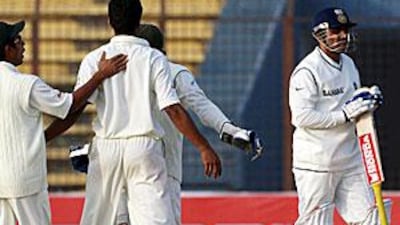Virender Sehwag is proving to be as instinctive when dealing with the media as he is when tackling opposition bowlers.
His comment about Bangladesh being "ordinary" prior to the opening Test in Chittagong tickled, angered and aroused cricket lovers the world over.
Sure, Bangladesh are no great force, but for an opposition captain - Sehwag is standing in for the injured MS Dhoni - to call them "ordinary" was just not cricket.
But Sehwag's comment must be examined closely in a world that is changing and becoming highly opinionated. Sehwag just said what others believed, but did not have the courage say so in public.
That his side let him down the very next day when the Bangladesh bowlers claimed eight wickets for a little over 200 runs is another matter. Sure, Sehwag looked silly after his soft dismissal, especially when the bowler, Shakib Al Hasan, happened to be his opposite number.
But he still scored a half century without which India's situation would have been all the more dire. That India were down in the dumps less than 24 after Sehwag made his extraordinary comment was a great story for the media.
But, spare a though for Sehwag, who has given aggressive batting such a good name in the recent past. Only last month, he was spoken of in the same breath as Sir Don Bradman when he nearly got his third triple hundred in Test cricket, against Sri Lanka.
It is a fact that Bangladesh have been poor. Before their two wins against the West Indies last July, they had only one Test victory to their name and that one came against lowly Zimbabwe in 2005.
It has been 10 years since the International Cricket Council (ICC) admitted them into the Test fold and they have made very little progress in this form of the game. Experts were right to slam the Jagmohan Dalmiya-led ICC when Bangladesh was awarded Test status in 2000.
All that they had going for them was passionate following for the game. Public interest cannot entitle a country to play at the highest level; only a strong domestic structure that regularly produces talent should be the criteria. Everyone profits from experience, but no team can gain too much by losing regularly.
Perhaps, that is what has happened to Bangladesh, and the ICC have not done much to arrest the quality problem. A way of helping Bangladesh could be to strip them of their Test status and introduce a system to facilitate a steady production line.
That is what the rulers of the game are expected to do too and not just oversee Test matches and organise World Cups and Champions Trophies. Sehwag's comments have caused a bit of embarrassment among his teammates too. It was reported Sachin Tendulkar told the media on Sunday he would not answer questions about Sehwag's pre-match comments. Not surprising, because Tendulkar is no expert when it comes to stoking fires.
However, Sehwag and his seniors should not be too defensive of his view on Bangladesh. Nor do they have to be childish when it comes to reacting to criticism.
The former Australia captain, Ian Chappell, stated recently that he did not believe India had enough firepower in their bowling to win consistently around the world.
"They've got some good bowlers ... sure, they've got a very good batting line-up, but the bowling is really not good enough to see them win consistently all around the world," Chappell said.
Harbhajan Singh was quick to react in a newspaper interview: "Who is Ian Chappell?" he asked. The Indian team need to handle criticism better.
To answer Harbhajan's question, Chappell is one of the most respected voices in the game apart from being a fine captain. If you disagree with his view, you have all the freedom to say so, but to question someone's expertise is ridiculous. We all have opinions. It is a simple fact of life.
Knowing Chappell as I do, he will not take too much notice of how people react to his view on India's bowling. Harbhajan is not the only cricketer to have a problem with Chappell's views and I am reminded of a story the Aussie told me while I was interviewing him at Lord's in 2007 as he celebrated 30 years of broadcasting.
While commentating on the 1977 Ashes in England, a member of the Australia team who happened to play under Chappell asked him why was he criticising him all the time.
Chappell told his former teammate that there was a button on the television set which he could use to turn off the volume and if he did not want to see his face, there was another button to turn off the set. Chappell was also questioned as to why he was being harsh on a struggling Kim Hughes in 1984 since he knew exactly how difficult it was to lead Australia.
He immediately reminded the Hughes sympathiser that he was not the Australia captain, but a commentator and journalist and it was only fair to be honest and direct with his viewers and readers.
Sehwag has been just that in his comment about Bangladesh being ordinary on the Test scene. It would be uncharacteristic of him to back away.
Clayton Murzello is the Group Sports Editor of the Indian newspaper Midday

